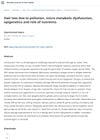 24 citations,
January 2013 in “Indian Journal of Dermatology, Venereology and Leprology”
24 citations,
January 2013 in “Indian Journal of Dermatology, Venereology and Leprology” Hormonal treatment is effective for women with acne not helped by usual treatments, especially if they have hormonal imbalances.
 12 citations,
June 2021 in “Scientific Reports”
12 citations,
June 2021 in “Scientific Reports” Curcumin may help reverse aging by targeting specific genes.
4 citations,
March 2022 in “Journal of cosmetic dermatology” The mixed preparation helped hair regrowth but wasn't better than minoxidil.

Ayurvedic herbs may reduce side effects and improve effectiveness of cancer treatments.
21 citations,
April 2021 in “ACS omega” Curcumin can be effectively loaded into polystyrene nanoparticles, which are safe for human cells and more biocompatible with curcumin inside.
7 citations,
January 2013 in “International Journal of Oral and Maxillofacial Surgery” Accurate diagnosis and various treatments can rejuvenate the upper face for a natural look.
May 2020 in “Business Innovation & Entrepreneurship Journal” PASIKULA, a turmeric-based hair removal product, successfully sold well and boosted turmeric's economic value.
 205 citations,
September 2018 in “Nutrients”
205 citations,
September 2018 in “Nutrients” Essential oils from Curcuma species, like turmeric, have compounds that can fight inflammation, cancer, and bacteria, and can also stimulate hair regrowth in bald males.
54 citations,
May 2021 in “Chemical Engineering Journal” The developed scaffold effectively treats chronic wounds by promoting healing and preventing infection.
January 2019 in “Can Tho University Journal of Science” The nanosilica-curcumin-bromelain complex speeds up wound healing and hair growth in burns.
48 citations,
March 2005 in “PubMed” Some plant-based compounds might help control the growth of new blood vessels if further research confirms their effectiveness.
August 2021 in “The journal of investigative dermatology/Journal of investigative dermatology” Hair growth supplements do not reduce the effectiveness of the breast cancer treatment tamoxifen.
 10 citations,
May 2018 in “Nutrition and Cancer”
10 citations,
May 2018 in “Nutrition and Cancer” Certain spices may help prevent and treat skin cancer, but more human trials are needed.
 31 citations,
February 2021 in “Nutrients”
31 citations,
February 2021 in “Nutrients” Curcumin may improve blood sugar levels and cholesterol in people with PCOS, but more research is needed.
17 citations,
April 2021 in “Frontiers in Pharmacology” Activating Nrf2 can help protect against hearing loss.
 November 2023 in “British journal of nutrition”
November 2023 in “British journal of nutrition” Curcumin supplements increase adiponectin and decrease leptin in adults.
 25 citations,
March 2018 in “Clinics in Dermatology”
25 citations,
March 2018 in “Clinics in Dermatology” Indigenous herbal medicines in the Indian subcontinent have potential for drug development but need more research and standardization.
 32 citations,
November 2020 in “Nanomaterials”
32 citations,
November 2020 in “Nanomaterials” Excipients greatly affect how well curcumin nanocrystals penetrate the skin and target hair follicles.
132 citations,
April 2007 in “European journal of pharmaceutics and biopharmaceutics” The microemulsion delivered the dye deeper into the skin than the cream.
 December 2021 in “Research Square (Research Square)”
December 2021 in “Research Square (Research Square)” Hair growth-promoting nutraceuticals do not block the cancer-fighting effects of tamoxifen and may enhance its action.
60 citations,
October 2020 in “Journal of Controlled Release” Curcumin nanocrystals in simple gels effectively penetrate hair follicles, but humectants can reduce this efficacy.
32 citations,
June 2021 in “Frontiers in Pharmacology” The hydrogel speeds up burn wound healing and promotes tissue regeneration.
 19 citations,
March 2010 in “Bioorganic & Medicinal Chemistry Letters”
19 citations,
March 2010 in “Bioorganic & Medicinal Chemistry Letters” Curcumin and its derivatives can block an enzyme important for making testosterone, with one derivative being particularly strong.
 February 2024 in “PloS one”
February 2024 in “PloS one” Nutraceuticals that promote hair growth do not reduce tamoxifen's effectiveness in breast cancer treatment.
 February 2022 in “Research Square (Research Square)”
February 2022 in “Research Square (Research Square)” Certain nutraceuticals may enhance hair growth without affecting the cancer-fighting properties of tamoxifen.
 September 2024 in “Brazilian Journal of Hair Health”
September 2024 in “Brazilian Journal of Hair Health” Nutrients can help improve hair growth and thickness caused by pollution.
 9 citations,
July 2018 in “Current Pharmaceutical Design”
9 citations,
July 2018 in “Current Pharmaceutical Design” HO-1 helps skin health and healing but can worsen melanoma; it's a potential treatment target for skin diseases.
 68 citations,
March 2019 in “Advanced Healthcare Materials”
68 citations,
March 2019 in “Advanced Healthcare Materials” Advanced hydrogel systems with therapeutic agents could greatly improve acute and chronic wound treatment.
 8 citations,
May 2021 in “Applied Materials Today”
8 citations,
May 2021 in “Applied Materials Today” New nano composite helps reduce scars and regrow hair during burn wound healing.
 January 2018 in “Hair transplant forum international”
January 2018 in “Hair transplant forum international” Nutrafol might help reduce hair loss due to inflammation, but more evidence is needed.


















